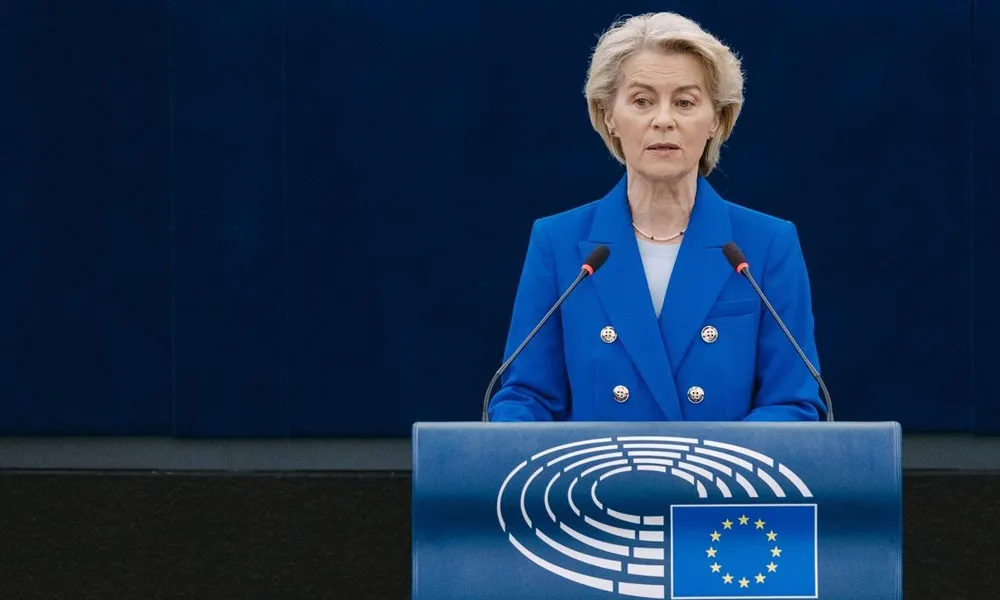European Commission President Ursula von der Leyen called for a coordinated, real-time EU response to an “escalating campaign” against Europe, “calculated to linger in the twilight of deniability,” citing recent airspace incursions and attacks on infrastructure that she linked to Russia.
Speaking to the European Parliament in a plenary debate on Wednesday, she said the incidents amount to “hybrid warfare” aimed at unsettling citizens, testing EU resolve and weakening support for Ukraine.
“In just the past two weeks, MiG fighters have violated Estonia’s airspace, and drones have flown over critical sites in Belgium, Poland, Romania, Denmark and Germany,” von der Leyen said, adding that as a result, flights were grounded, jets scrambled and countermeasures deployed.
She also pointed to undersea cables being cut, airports and logistics hubs paralysed by cyberattacks, and elections targeted by malign influence campaigns.
Deliberate campaign against Europe
“One incident may be a mistake. Two, a coincidence. But three, five, ten? This is a deliberate and targeted grey zone campaign against Europe,” she said.
Von der Leyen argued that while the EU must investigate each incident, it should “not shy away from attributing responsibility,” stressing that “every square centimetre of our territory must be protected and safe.” She framed unity as the best answer to efforts “to sow division,” highlighting that Italian pilots under NATO air policing escorted Russian jets from Estonian skies, while Ukrainian experts are sharing frontline experience to help Member States counter drone incursions.
“But we must not only react, we must deter. Because if we hesitate to act, the grey zone will only expand.”
Setting out next steps, she said Europe must “urgently equip itself with a strategic capacity to respond” to the changing nature of warfare and be able to act in real time. The Commission’s Readiness 2030 agenda aims to mobilise up to €800 billion by 2030. After presenting a scoping paper to leaders in Copenhagen last week, the Commission will unveil a ‘Preserving Peace – Readiness Roadmap 2030’ in two weeks, with common objectives, milestones and timelines.
Autonomous systems key to Europe’s security
Her first priority is addressing airspace violations through pan-European projects such as the Eastern Flank Watch and Drone Wall. Using high-end fighter jets to stop cheap, mass-produced drones is “absolutely not sustainable,” she said, calling for an affordable, purpose-built system for swift detection, interception and, when necessary, neutralisation. The anti-drone shield should take a 360-degree approach, covering the entire Union, including the southern flank, and be adaptable to a wide range of challenges, from natural disasters and organised crime to “weaponised migration” and monitoring the “Russian shadow fleet.” Von der Leyen said the EU has “much to learn from Ukraine,” especially its rapid-innovation ecosystem.
“Autonomous systems are at the centre of 21st century security. And Europe must be at the cutting edge.”
Second, von der Leyen said the EU has identified nine critical capabilities, from air defence to cyber and electronic warfare. For each, the Commission will back Collective Capability Coalitions, groups of Member States delivering together at speed, building on “lead-nation” models used to supply weapons and ammunition to Ukraine.
Third, the Commission head insisted none of this is possible without a stronger European defence industry. Too much investment still goes outside the Union, she said, arguing that defence spending must also drive EU jobs and competitiveness. At least 65% of any project funded under SAFE must be based in the EU, she noted.
New mindset needed
“Tackling Russia’s hybrid war is not only about traditional defence,” von der Leyen concluded, citing software for drones, spare parts for pipelines, rapid cyber-response teams and public information campaigns.
“This requires a completely new mindset for all of us. We must be ready to leave our comfort zone. We need to explore new ways of doing things,” she said, adding, “The choice before us is simple. We can either shy away and watch Russian threats escalate, or we meet them with unity, deterrence and resolve.”
